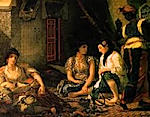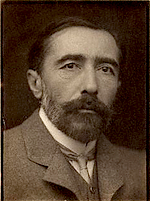Monday, December 13, 2010
By MATTHEW ROTHSCHILD [The Progressive] – I’m as unhappy with Obama as the next progressive, but I don’t think it’d be a good idea to mount a primary challenge to him, and here’s why.
First of all, it would be extremely divisive within the Democratic Party, and it would drive a wedge between the largely white left and the overwhelming majority of African Americans at the grassroots, who constitute the party’s most loyal constituency. The last thing we need is to incite racial animosity on the left.
Continue reading “How to save America from inciting ‘racial animosity on the left.’” »
Sunday, December 12, 2010
 By JACKIE WULLSCHLAGE [Financial Times] – Sheikha Al Mayassa bint Hamad bin Khalifa Al-Thani, the chairman of Qatar Museums, who has just launched Doha’s own survey of orientalist painting, says: “Although the notion of ‘orientalism’ is commonly perceived as a view from the west on the east, we believe that there is an opportunity to explore and appreciate the spaces in between. One may debate the composition of the works and question its accuracy – but one cannot deny the historical overview it gives us; nor the opportunity for discussion and reflection.”
By JACKIE WULLSCHLAGE [Financial Times] – Sheikha Al Mayassa bint Hamad bin Khalifa Al-Thani, the chairman of Qatar Museums, who has just launched Doha’s own survey of orientalist painting, says: “Although the notion of ‘orientalism’ is commonly perceived as a view from the west on the east, we believe that there is an opportunity to explore and appreciate the spaces in between. One may debate the composition of the works and question its accuracy – but one cannot deny the historical overview it gives us; nor the opportunity for discussion and reflection.”
Continue reading “Europeans don’t make Arabs like this any more.” »
Saturday, December 11, 2010
By TERRY TEACHOUT [Wall Street Journal] – Most of us, I suspect, like to think of artists as a breed apart, a cadre of idealists whose souls have been ennobled by long exposure to beauty. The truth, however, is that they are every bit as human as the rest of us, and that a certain number of them are self-centered opportunists who are perfectly willing to ignore evil so long as the evildoers leave them in peace to do their work. That was pretty much what many German musicians did when the Nazis came to power in 1933. Within a matter of days, Hitler and his henchmen started putting into place a policy of systematic persecution of German Jews. Numerous well-known Jewish musicians, including Bruno Walter, Otto Klemperer and Emanuel Feuermann, either were forced out of their posts or quit in protest.
Continue reading “Actually, no – the show doesn’t have to go on.” »
Friday, December 10, 2010
By GEORGE WEIGEL [First Things] – Tony Blair was one of the more engaging public figures of recent years, and in that respect his memoir is precisely what one might expect: articulate, energetic, clever in argumentation. Blair was often accused, not without reason, of being a master of spin. Yet, in A Journey , he is admirably frank about both politics and personalities, although his candor on the latter front can be serially bracing, jarring, and weirdly confessional.
, he is admirably frank about both politics and personalities, although his candor on the latter front can be serially bracing, jarring, and weirdly confessional.
Continue reading “The uncomfortable former resident at No. 10.” »
Wednesday, December 8, 2010
By WES DAVIS [The Nation] – Deborah Devonshire’s books—beginning with The House (1982) and The Estate (1990)—focus largely on the management of Chatsworth, the massive estate in Derbyshire that she and her husband put into charitable trust and opened to the public in 1981. (The house was a stand-in for Mr. Darcy’s Pemberley in a film adaptation of Pride and Prejudice, and throughout the letters Leigh Fermor refers to it as “Dingley Dell,” after Mr. Wardle’s house in The Pickwick Papers.) As a writer, she is best when describing the seasonal rhythms of country life (the arrival of the year’s pullets, say) or assessing the gamut of rural arts (from drystone walling to mushroom gathering) and tilling their linguistic soil.
Continue reading “What kind of woman milks a goat in the first-class waiting room while holding a third-class ticket?” »
Tuesday, December 7, 2010
 By RICHARD LEA [Guardian] – A missing piece in the portrait drawn by Philip Larkin of his secretary and lover, Betty Mackereth, has been filled in with the discovery of a previously unpublished poem, “Dear Jake”.
By RICHARD LEA [Guardian] – A missing piece in the portrait drawn by Philip Larkin of his secretary and lover, Betty Mackereth, has been filled in with the discovery of a previously unpublished poem, “Dear Jake”.
Discovered in a tatty envelope for internal Hull University communications among a shoebox full of letters, the poem is a touching address to a woman who brought some happiness to the latter period of Larkin’s life.
The poem was found by the producer Simon Pass during the making of a documentary about the poet’s relationship with Mackereth, due to be shown on BBC4 …to mark 25 years since his death in 1985. According to Pass, the fact that the poem was typed is a signal that this should be considered “a completed piece”.
Pass said that the manuscript was enclosed with a card from Larkin saying, “This is for you. You can sell it later on,” and explaining that it should be read in conjunction with “Posterity”, his 1968 poem imagining a cynical biographer misunderstanding his life.
Continue reading “Dear Jake: poem found; shoes missing.” »
By CLANCY MARTIN [Chronicle of Higher Education] – You’d think I’d get used to being called a liar. After all, I’ve written a candid, semiautobiographical novel about being a scam artist, been interviewed in the media about my former life of lying, cheating, and drinking, even edited a prominent philosophical collection on deception. But when a colleague recently ridiculed me about being known as a liar, my feelings were hurt. I have a new life. I’ve been clean and sober and “rigorously honest” (as we say in AA) for two years. Still, to tell you the truth (honestly!), I earned my reputation fair and square.
Continue reading “Is being a philosopher the only way to redemption for a serious liar?” »
THE DATA LEAKED FROM the University of East Anglia should not be discredited simply because it was leaked. Even those sceptical of man-made global warming may find surprising conclusions based on examination of the data.
For example, one truly astonishing thing about global warming is how little warming is actually happening, at least compared to the amount of warming that led climatologists to predict global disaster. Using data from East Anglia (and graphic elements from conventional sources), this article documents the changes that are occurring and examines the predictions that have been made. Continue reading “Looking for a little warmth in East Anglia’s climate data.” »
Saturday, December 4, 2010
By PATRICIA COHEN [New York Times] – Victorians were enamored of the new science of statistics, so it seems fitting that these pioneering data hounds are now the subject of an unusual experiment in statistical analysis. The titles of every British book published in English in and around the 19th century — 1,681,161, to be exact — are being electronically scoured for key words and phrases that might offer fresh insight into the minds of the Victorians.
This research, which has only recently become possible, thanks to a new generation of powerful digital tools and databases, represents one of the many ways that technology is transforming the study of literature, philosophy and other humanistic fields that haven’t necessarily embraced large-scale quantitative analysis.
Continue reading “Victorian literature by the numbers.” »
By COLIN C. ADAMS [American Scientist] – In 1884, the English minister, headmaster, and biblical and Shakespearean scholar Edwin Abbott Abbott produced a thin volume titled Flatland: A Romance of Many Dimensions. It was both an introduction to the notion of higher dimensions and a satire of Victorian society and norms. At that time, there was substantial interest in the idea of higher dimensions, both within the scientific community and also in the more general population. Abbott’s work provided a simple story that allowed lay audiences to grasp the idea of dimensions beyond the familiar three. Flatland helped to set the stage for many of the scientific advances to come.
Continue reading “As literature, it’s flat as a ‘Star Trek’ episode – but never as stale.” »
Thursday, December 2, 2010
By ED PARK [Poetry Foundation] – “Quintessence of the Minor: Symbolist Poetry in English,” by the California poet Garret Caples, is the first in Wave Books’ pamphlet series, and the format perfectly suits the subject. Its very appearance is minor. The cream pages, stapled twice at the spine, sit in the hand like the program for a lengthy wedding. There’s no jacket copy, no information about Caples or Wave’s new series. It doesn’t even say how much it costs! Touch the uncoated cover after reading the sports section, and the smudge is there for good. This feels like a document made to be passed on, in secret, to a fellow traveler.
Continue reading “Minor events and optical illusions in literature.” »
Wednesday, December 1, 2010
By THEO PADNOS [London Review of Books]– ‘When a Muslim land is attacked,’ Roshonara Choudhry told the police, ‘it becomes obligatory on every man, woman, and child and even slave to go out and fight and defend the land.’ Iraq had been attacked; Choudhry, under the influence of Anwar Awlaki’s teachings, believed it was her religious duty to do away with Stephen Timms MP. But why Timms? the police wondered. ‘I’m just one person and I did what I could,’ Choudhry said.
Continue reading “YouTube’s must-see videos for assassins.” »
Tuesday, November 30, 2010
By JOSEPH EPSTEIN [Commentary] – An immitigable highbrow, Eliot was concerned about the slackening of high culture and the diminishing quality of education—concerns that have proved prophetic. The poetry on which his reputation as a leading figure of the modernist avant-garde was based was not easily comprehended. “Poets, in our civilization, as it exists at present, must be difficult,” he wrote, but he also wrote that “genuine poetry can communicate before it is understood,” which seems to have been the case with his. His criticism, much of which began as lectures, always came from on high…
Continue reading “How Eliot nurtured his fame in the basement of a bank.” »
Monday, November 29, 2010
By Kate Hoyland.

Conrad: 'the old colonialist'.
WHEN MY FRIEND PETER, who grew up in Southern China during the dregs of the Maoist days, first saw a Western tourist – a backpacker gone astray – he thought the man must be as free as a bird, the epitome of liberation. Shortly afterwards he hooked up with a group of US missionaries, and, ever the pragmatist, memorised chunks of the Bible in return for English lessons. This became his party piece: something with which to impress other Western tourists, during long nights drinking beers (the tourists paid) and eating shelled peanuts. He lives in Norwich now, and runs a takeaway, and is fulsome in his praise of the NHS hospitals where both his children were born.
I laughed when Peter quoted me chunks of the Bible: his ticket to English, that language of passports and visa stamps.
Continue reading “Inventing Asia, with Conrad, Greene, and a tourists’ Bible.” »
Saturday, November 27, 2010
By ROGER BERKOWITZ [Democracy] – We must face our unwillingness to judge. This fear of judgment is all too recognizable—the political thinker Hannah Arendt was writing about it in the middle of the last century. In her essays and books, Arendt gave voice to what she called the “fear of passing judgment, of naming names, and of fixing blame—especially, alas, upon people in power and high position.” Reflecting upon the anger caused by her own judgment of the Judenräte—the Jewish community leaders who cooperated with the Nazis in the hopes of saving themselves, their families, and others—Arendt was struck by the fear and anger that judging others provoked. Continue reading “Who are we to judge the wickedness of those who do not judge?” »























